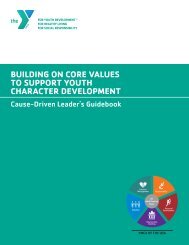CDLI_Guidebook_18_Final_Print
Create successful ePaper yourself
Turn your PDF publications into a flip-book with our unique Google optimized e-Paper software.
How does this relate to the <strong>CDLI</strong> adult practice areas?<br />
High-quality youth programs can create the settings and experiences where youth learn the social<br />
and emotional skills they need to succeed in life. Intentionality in youth development leader practices,<br />
including both behaviors (e.g., modeling appropriate use of emotion) and program structure design,<br />
activities, and routines that introduce and reinforce SEL development are critical to this learning.<br />
As programs pursue the path of continuous improvement, they find that staff retention improves,<br />
staff ownership of the assessment process increases, and staff become more reflective about their<br />
own work (Smith, Akiva, Blazevski, Pelle, & Devaney, 2008). When staff members hone the practices<br />
measured on the SEL PQA, they deepen relationships with the youth in their programs, and provide<br />
increased opportunities for youth voice and ownership. As youth have increased opportunities for key<br />
developmental experiences, they are able to cultivate critical thinking and other skills necessary for<br />
success in work, school and life.<br />
The SEL PQA is applicable to programs that serve both school-age (grades K-6) and youth (grades 4-12).<br />
The SEL PQA consists of four domains, <strong>18</strong> scales and 70 items. The SEL PQA items are focused<br />
on observable practices at the point-of-service, or the place where youth and staff interact. The<br />
domains include Safe Space, Supportive Environment, Interaction, Engagement.<br />
These four domains have been cross-walked with the <strong>CDLI</strong> practice areas and generally align to those<br />
shown below.<br />
PRACTICE AREAS<br />
EMOTION<br />
MANAGEMENT<br />
EMPATHY<br />
PERSONAL<br />
DEVELOPMENT<br />
RELATIONSHIP<br />
BUILDING<br />
RESPONSIBILITY<br />
- Emotional<br />
Safety<br />
- Emotion<br />
Coaching<br />
- Mindfulness<br />
- Warm<br />
Welcome<br />
- Empathy<br />
- Belonging<br />
- Skill Building<br />
- Active Learning<br />
- Choice<br />
- Encouragement<br />
- Collaboration<br />
- Leadership<br />
- Planning<br />
- Problem Solving<br />
- Warm Welcome<br />
- Interactions with<br />
Adults<br />
- Encouragement<br />
- Belonging<br />
- Collaboration<br />
- Leadership<br />
- Empathy<br />
- Session Flow<br />
- Responsibility<br />
- Leadership<br />
Planning<br />
- Reflection<br />
The SEL PQA can be completed by program staff or by a reliable external assessor. Program selfassessment<br />
is an adaptable, consensus-driven process that provides site managers and frontline staff<br />
with opportunities to evaluate, discuss, and build on a shared understanding of instructional quality<br />
in their programs. This process includes managers and staff observing multiple program offerings<br />
and together, scoring a single program-wide PQA. Reliable external assessors focus on staff-youth<br />
interactions in program offerings, collecting objective anecdotal evidence for every indicator on the tool,<br />
observing a single program offering and scoring a PQA based on the observation.<br />
CHARACTER DEVELOPMENT GUIDEBOOK<br />
P 45



